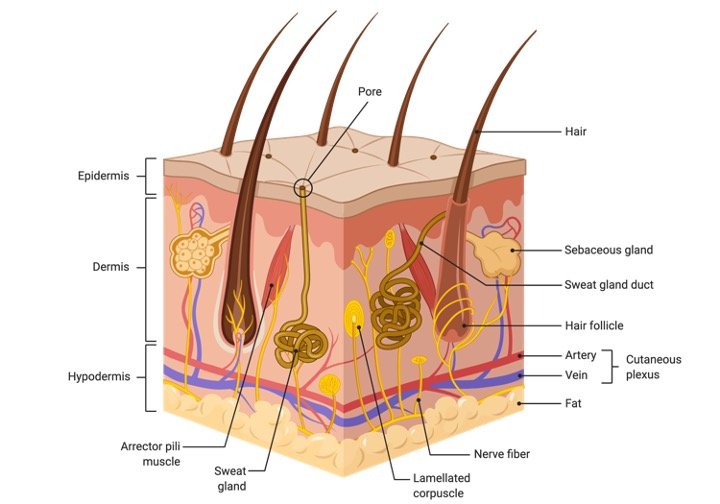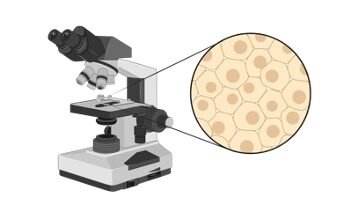Table of Contents
Perspiration Definition
Perspiration is the process that involves the secretion of fluid like sweat from sweat glands. As it is both a verb and noun as it can refer to the sweat produced or the very act of sweating.
Sweat is comprised of water, lactic acid, urea, and other minerals. This process can only be observed in mammals, but some mammals like humans, horses, etc. sweat more as they have more sweat glands.
Humans have around 2-4 million sweat glands. This physiological process helps in bringing down the temperature of the body.
What is Perspiration?
Perspiration is a means of thermoregulation in organisms like humans and other primates that have many sweat glands. It functions to maintain normal body temperature irrespective of the temperature of their surrounding. Sweating helps lower its body temperature as the sweat evaporates from the body.

In other mammals that have fewer sweat glands, perspiration plays only a minor role in thermoregulation. For instance, dogs do have few sweat glands on their feet pads that help them to feel cool but they use panting as a mechanism for thermoregulation as the water evaporates from the throat and mouth.
Another example is rhinos and pigs where sweating alone is not sufficient so they wallow in mud that helps lower their body temperature. Hippos spend most of their time in the water to stay hydrated and cool as true sweat glands are absent in them.
Cetaceans like whales and porpoises also do not have sweat glands and depend on water for maintaining their temperature.
Types of Sweat Glands
Two types of sweat glands include apocrine and eccrine. Eccrine sweat glands can be located all over the body and they are numerous in number. They secrete odorless sweat and consist of salt and water.
They are usually found in the large numbers on the soles of feet, palms, and head. Apocrine sweat glands are located only on specific sites on the body like ear canals, armpits, and genitals and produce odorless sweat.
The particular smell or scent of body odor occurs as a result of bacterial decomposition. These glands are also sensitive to the concentration of adrenaline so humans perspire more when they are stressed, or in pain or fear, or experience sexual arousal.
The ceruminous gland and sweat gland secretions may differ in many Asian people due to a mutation in the ABCC11 gene due to which they produce less body odor than others. They also tend to have dry earwax. As ceruminous glands are modified sweat glands, the same gene affects their functioning also.
Hyperhidrosis
It refers to excessive perspiration condition also known as diaphoresis or hidrosis. It can be of 2 types: primary or secondary. Primary hyperhidrosis is present from birth and it is general in nature that involves all the body.
Secondary hyperhidrosis is acquired due to disorders like thyroid or menopause and can be localized to a specific site. Stress or anxiety may incline the symptoms of the primary type as the sympathetic nervous system is involved which leads to greater perspiration.
Treatment of Hyperhidrosis
Primary hyperhidrosis is treatable with many treatment options. Clinical strength deodorants can be prescribed that comprise a higher quantity of aluminum chloride than other deodorants.
Another type of treatment is iontophoresis whose mechanism is not well understood but is effective and in use as a treatment method since the 1940s. In this technique feet or hands are immersed in water that has a low electrical current passing through it.
Anticholinergics prescription can also be taken orally before a stressful event but can have side effects like constipation. Botulism toxin injections can also give temporary relief that lasts 9 months.
Sugary can be a last resort method if no other technique is working; sweat glands are removed or sympathetic nerves that supply to these are impaired. There are also some side effects to this method as the person may sweat more from other parts. The removed nerves may also regenerate after surgery.
Affected people may adapt to new lifestyle changes required to decrease sweating like wearing breathable fabrics that are loose fit, bathing often, and consuming less spicy food and alcohol.
Perspiration Citations
- Cholinergic induction of perspiration attenuates nonhistaminergic pruritus in the skin of patients with atopic dermatitis and healthy controls. Br J Dermatol . 2015 Jul;173(1):282-4.
- Electrochemical tattoo biosensors for real-time noninvasive lactate monitoring in human perspiration. Anal Chem . 2013 Jul 16;85(14):6553-60.
- Developing a new device for continuously recording, in vivo, the excretion rate of sweat (perspiration) in humans. Skin Res Technol . 2019 Jul;25(4):489-498.
- Perspiration. Indian Med J . 1946 Jul;40:196-8.
- Images are created with BioRender.com
Share












